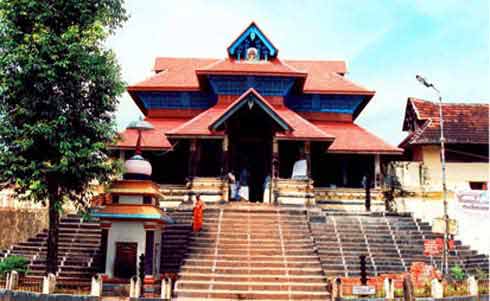Aranmula Parthasarathy Temple
The Aranmula Parthasarathy Temple is a Hindu temple dedicated to Lord Krishna, worshipped here as Parthasarathy, the charioteer of Partha, prince Arjuna. It is located in the village of Aranmula, Pathanamthitta District, Kerala, India. The temple is revered in Nalayar Divya Prabhandam and is among 108 divya deshams. Nammalvar has sung one hymn and Tirumangai Alvar has sung eleven hymns
The Aranmula Parthasarathy Temple is one of the five ancient shrines in the Chengannur area of Kerala, connected with the legend of the Hindu epic Mahabharata. Legend has it that the Pandava princes, after crowning Parikshit as king of Hastinapura left on a pilgrimage. On arriving on the banks of Pamba River, each one is believed to have installed a tutelary image of Krishna; Thrichittatt Maha Vishnu Temple by Yudhishthira, Puliyur Mahavishnu Temple by Bheema, Aranmula by Arjuna, Thiruvanvandoor Mahavishnu Temple by Nakula and Thrikodithanam Mahavishnu Temple to Sahadeva. Legend has it that Arjuna built this temple, to expiate for the sin of having killed Karna on the battlefield, against the dharma of killing an unarmed enemy. It is also believed that here, Vishnu revealed the knowledge of creation to the god Brahma, from whom the Madhu-Kaitabha demons stole the Vedas.
The image of the temple was brought here in a raft made of six pieces of bamboo to this site, and hence the name “Aranmula” (six pieces of bamboo). There is another story, which says it was brought in a raft made of seven pieces of bamboo, out of which one got separated at a place 2 km upstream of the current Temple’s location on the banks of Pamba. The place is called “Mulavoor Kadavu” meaning “river bank where the bamboo pole came off.
The Aranmula Parthasarathy Temple is a beautiful example of traditional Kerala architecture. The temple has four towers over its entrances on its outer wall. The Eastern tower is accessed through a flight of 18 steps and the Northern tower entrance flight through 57 steps leads to the Pamba River. The temples has paintings on its walls dating back to early 18th century. Thulabaram, the practice of weighing oneself against material and donating it to the temple is practiced here. The Vanni tree in the temple is believed to have medicinal values. The fruits of the Vanni tree are also weighed in Thulabaram and also used for curing diseases of the devotees.
The Aranmula Parthasarathy Temple is famous for its annual Vallasadya (ritual feast) and Vallamkali (boat race). The Vallasadya is a feast that is held on the Thiruvonam day of the Onam festival. The feast is attended by thousands of people from all over Kerala. The Vallamkali is a boat race that is held on the Pamba River on the day after the Vallasadya. The boat race is one of the most popular boat races in Kerala.As per Hindu legend in Mahabharata, Arjuna, one of the Pandavas was returning with the image of Krishna after along penance. He faced a huge flood in the Pamba river. A poor low caste Hindu helped him cross the river with a raft made with six bamboos. It is believed that the boat race is celebrated annually on the Pamba river to commemorate the poor Hindu. The race is held on the last day of the Onam festival when snake boats around 100 ft (30 m) with four helmsmen, 100 rowers and 25 singers participate.
The Aranmula Parthasarathy Temple is also famous for its metal mirrors, known as Aranmula Kannadi. These mirrors are made using a traditional process that has been passed down for generations.
The Aranmula Parthasarathy Temple is a popular pilgrimage site for Hindus from all over India. The temple is also a popular tourist destination, known for its beautiful architecture, its annual festivals, and its traditional metal mirrors.

State: Kerala
Famous for/as: Pilgrim Divya Desham
Languages: Malayalam
Temple Timings:
- 4 AM to 12 PM
- 5 PM to 8 PM
Dress Code and Restrictions:
- Only traditional dress is allowed for men & women. Men need to take off shirt while entering the temple premises.
- Mobiles and Cameras are restricted.
How to reach:
- By Air: The nearest airport are Kochi and Thiruvananthapuram which are around ~120 km away from the temple.
- By Rail: Nearest railway station is Chengannur which is about ~10 kms from temple and Regular trains are available from Kochi, Thiruvananthapuramand major cities of India
- By Road: Well connected with all major cities and local State Buses are available from Kochi, Thiruvananthapuram and other major cities of Kerala.